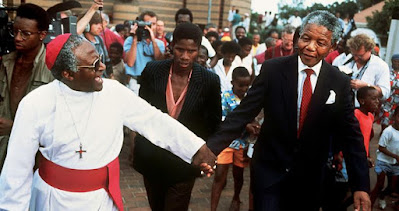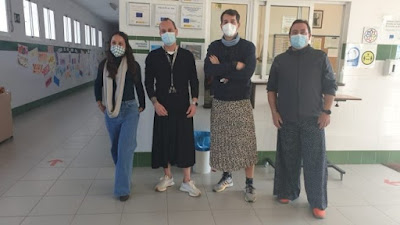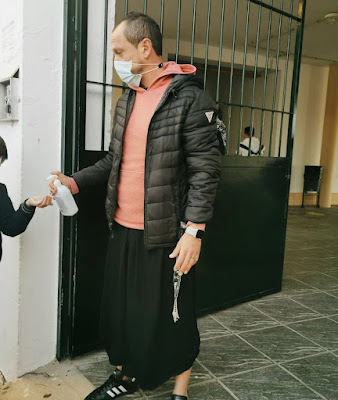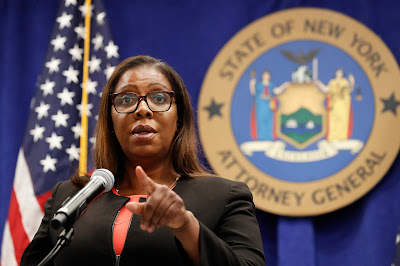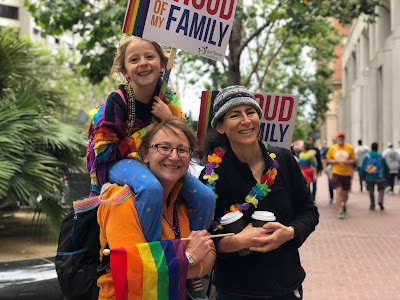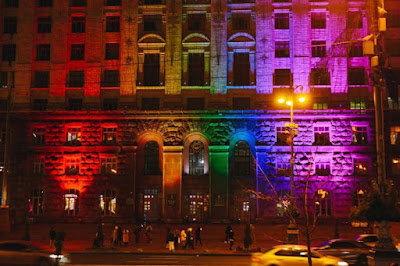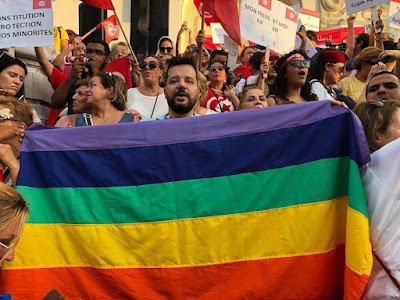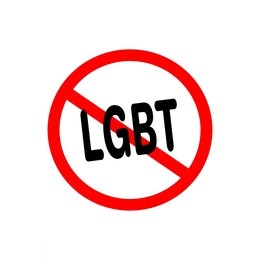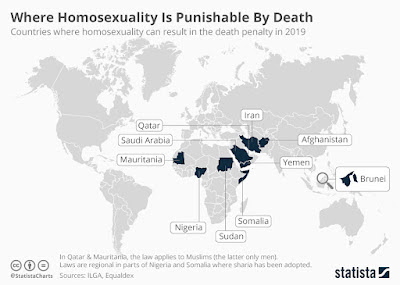This blog covers world political issues, mostly about LGBTQ news and rights, and other topics of my interest.
Friday, December 31, 2021
Wednesday, December 29, 2021
Several progress on LGBTQ issues around the world in 2021 but still remains much to be done
Across the world, gay people have gained many protections with changes in laws and norms surrounding the issue of same-sex marriage, discrimination and equal rights. Global acceptance of the LGBTQ community is on the rise, according to the Pew Research Center.
But that doesn't mean that stigma, discrimination and homophobic attacks have ended. Places such as Poland and Hungary have seen a reversal of hard-won progress, with conservative governments stoking anti-LGBTQ sentiment in the name of family values. In Afghanistan also returned to "dark days" with Taliban. And places like Qatar or Chechnya still are dangerous places for gay people.
But despite setbacks and abuses, several parts of the world have rekindled hope by taking steps this year to advance the rights of the LGBTQ community.
For example, in Asia, the tiny Himalayan kingdom of Bhutan became the latest Asian nation to decriminalize homosexuality this year. Furthermore, Bangladesh elected its first transgender mayor in 2021, Nazrul Islam Ritu, who beat her rival in a landslide election to become mayor of the small rural town of Trilochanpur in western Bangladesh, where she was born. And another Himalayan country, Nepal, introduced a third gender category in its census this year for the first time, alongside male and female.
In North America, the United States this year saw a restoration of rights related to sexual orientation and gender identity that were rolled back by the previous Trump administration. U.S. President Joe Biden ended a ban on service by transgender people in the military, reversed a policy which previously allowed health care companies to deny coverage to gay and transgender people and signed an executive order against LGBTQ discrimination in education.
Besides, former 2020 presidential candidate Pete Buttigieg became the first openly gay Cabinet member confirmed by the U.S. Senate, and he caused a flutter by going away on parental leave for several weeks after he and his husband adopted twins.
Canada also joined a growing push around the world to ban conversion therapy by passing a bill formally outlawing it.
In South America, Chile passed a historic bill granting equal marriage rights to same-sex couples. The country legalized same-sex civil unions in 2015, and had been eagerly awaiting the legalization of gay marriage since then-president Michelle Bachelet sent a bill to Congress in 2017. Chile joins just a handful of nations in majority Catholic South America with similar laws, they include Argentina, Uruguay, Brazil, Colombia and Ecuador.
On the other hand, in Europe, Switzerland became one of the last remaining nations in Western Europe to approve same-sex marriage; and France passed a law that expanded access to its free fertility treatments, such as artificial insemination and in vitro fertilization to women in same-sex relationships and single women.
Finally, in Africa, Botswana's court of appeal upheld a 2019 ruling that decriminalized same-sex relationships, in what was hailed as a major victory for gay rights campaigners on the continent. In addition, a new criminal code went into effect in Angola. The new penal code scraps a 133-year passage banning same-sex relations, put in place when the southwest African nation was still a Portuguese colony.
Several progress on LGBTQ issues in 2021, but we still have to fight and work around the world to make it a better place for everyone.
Monday, December 27, 2021
South African Archbishop Desmond Tutu dies after a life fighting against apartheid and homophobia
Desmond Tutu, a leader of the nonviolent anti-apartheid movement in South Africa and a vocal LGBTQ rights supporter, died Sunday, December 26 in Cape Town. He was 90.
Archbishop Desmond Tutu was an Anglican bishop and a leader of the anti-Apartheid movement in South Africa. Born in 1931, he followed in his father's footsteps, becoming a high school teacher. He then switched paths to become an Anglican priest. Tutu was on the frontline fighting for freedom and equality in South Africa, where racially segregated apartheid began in 1948.
Tutu won the Nobel Peace Prize in 1984 for his work against anti-Black apartheid laws that segregated South Africa based on race and maintained a decades-long system of oppression against Black South Africans. The Anglican reverend compared anti-LGBTQ laws and persecution to the apartheid laws he worked had to dismantle in his home country.
In 1994, South Africa elected its first black president Nelson Mandela. Tutu said voting in that democratic election was "like falling in love." The two were counterparts in the struggle for freedom.
After Mandela's election, the Archbishop chaired the Truth and Reconciliation Commission, investigating crimes of the apartheid era. He delivered the final report to Mandela in 1998.
Tutu advocated for racial justice and LGBTQ rights globally. In 2013, speaking at the launch of the United Nations’ Free and Equal Campaign, he said, “I would not worship a God who is homophobic and that is how deeply I feel about this. I would refuse to go to a homophobic heaven. No, I would say sorry, I mean I would much rather go to the other place. I am as passionate about this campaign as I ever was about apartheid.”
Rest in peace!
Saturday, December 25, 2021
Tom Daley delivers alternative Christmas message on homophobia in sport
Olympic diver Tom Daley delivered Channel 4’s alternative Christmas message this year, addressing the issue of homophobia in sports such as football.
He said how “incredibly lucky” he feels that his sport has supported him to live publicly as a gay man, but acknowledge not everyone in sport has the same backing.
He reflected on the first time a transgender athlete competed at the Olympics in Tokyo, and he applauded the achievements of such athletes “especially in the current climate of fear and panic around trans people”, and add that “there is no LGB without the T”.
He also tackled the absence of openly gay players in top flight football, saying that he feels ‘incredibly lucky’ that diving has supported him to live publicly as a gay man.
Speaking about the UK, he added: "If I had one Christmas wish, it would be that next year that changes. That one impossibly brave Premier League player steps forward and says, I am gay”.
He added: "That person would inspire gay people everywhere, give hope to thousands of teenagers struggling with their sexuality and save the lives of countless young people who don’t currently feel like they have a place in this world."
In 2022 the World Cup is being held in Qatar, the second most dangerous country for queer people, Qatar. "Why are we allowing places that aren’t safe for all fans and all players to host our most prestigious sporting events?," he asked.
The broadcaster’s director of programmes Ian Katz said: "Tom Daley’s Olympic triumph made him one of the faces of 2021 and we are delighted that he is using The Alternative Christmas Message as a platform to speak out and raise an issue close to his heart, and ours."
Thursday, December 23, 2021
LGBT rights and issues in sub-Saharan Africa
The U.K. House of Commons Library published a report about LGBT rights and issues in sub-Saharan Africa.
Sub-Saharan Africa, encompassing 46 of the 54 countries on the African continent, has some of the world’s most restrictive legislation against LGBT people.
Same-sex sexual acts continued to be illegal in 25 of the 46 countries (54%). At one extreme, in Nigeria’s 12 northern states, the death penalty is the legally prescribed punishment for consensual same sex sexual acts.
In many African countries LGBT people may be stigmatised and excluded from society. Many are forced to hide their identities in fear of their safety.
Across sub-Saharan Africa, legal discrimination is, in part, a legacy of colonial-era laws. Many governments have not taken steps to reform these laws. While enforcement and legal penalties vary, the fact they remain on the statute-books suggests the threat of legal enforcement remains and anti-LGBT discrimination may be tolerated.
Some countries have also gone further in tightening restrictions. In 2021 the the Uganda Sexual Offenses Bill was passed, which includes a clause criminalising same-sex relationships.
Where there are limited legal protections, discrimination can also affect the ability of LGBT people to access health and other services. This can lead to greater inequalities, such as increased HIV prevalence, access to jobs, and experience of hate crimes.
Read the report here.
Wednesday, December 22, 2021
Teachers wear skirts to support a harassed trans student in Spain
Teachers and students of César Barrios School in Lepe (Spain) go to classes with skirts and painted nails in solidarity with a trans girl harassed by some of her classmates
The 11-year-old student had been subjected to constant verbal humiliation by some of her classmates. Some students did not even allow him to continue entering the boys’ bathroom.
“He began to receive verbal harassment and humiliation from a dozen colleagues,” said Joaquín Hernández, the school principal.
The level of bullying was so high that the teachers assured that the child’s academic performance decreased considerably.
For this reason, the school principal took the initiative to attend the place with painted nails and wearing a skirt. This decision was joined by the other teachers on the educational campus and also other students who showed their support for the student.
In addition, from school they launched the campaign ‘I am not your joke’ on social networks in which they stated: “You do not choose sexuality or gender identity; you are born with one. You choose not to express it and live bitterly, or to express it and be attacked. Unfortunately, the options that exist in the society we live in are: live bitter or be attacked“, they added.
#NoSoyTuChiste
Tuesday, December 21, 2021
When Harry met Santa, in Norway
The Christmas commercial from the Norwegian Postal Service (Posten Norge) is totally outstanding.
The four-minute video, titled “When Harry Met Santa,” shows the development of the relationship between Harry, a lonely Norwegian man albeit with a loving family, and Santa Claus, over several Christmasses.
Each year, the two men get to know each other a little better, but the problem is Santa can only visit on one day every year. Santa finally calls on Posten for help delivering Christmas gifts, allowing him to spend more time with Harry. The two men finally share a kiss.
The love story celebrates the upcoming 50-year anniversary, in June 17, 2022, since Norway abolished a law prohibiting same sex relations.
Awesome!!!
Watch the video below:
Sunday, December 19, 2021
U.S. federal court rules photographer has to serve LGBTQ people equally
Professional photographer Emilee Carpenter, with help from the anti-LGBTQ hate group Alliance Defending Freedom (ADF), field a lawsuit claiming New York's nondiscrimination laws forced her to create work "against her beliefs" or face numerous fines.
Carpenter sued the state for violating her First and 14th Amendment rights after being asked to photograph same-sex couples.
"Just as the government cannot compel a lesbian baker to create a cake condemning same-sex marriage or an atheist playwright to wax positively about God, New York cannot force Emilee to convey messages she objects to,” the lawsuit said.
U.S. District Judge Frank P. Geraci Jr. of Western New York dismissed Carpenter's suit, stating the nondiscrimination laws "simply seek to guarantee that businesses purporting to serve the public truly do serve the public."
“This court decision is a huge victory in our pursuit to ensure that every New Yorker has equal access and equal protections under the law,” said New York Attorney General Letitia James in a statement. “My office will always fight to ensure that every New Yorker is treated equally under the law across our entire state.”
Carpenter and ADF announced that they would appeal.
Friday, December 17, 2021
This Christmas, kiss hate goodbye!
This Christmas, Stonewall have launched a campaign encouraging the LGBTQ community to “kiss goodbye to hate” underneath a rainbow mistletoe.
The ‘Proud Mistletoe’ campaign has launched after the UK Government’s own National LGBTQ Survey found that 40% of respondents experienced a negative incident in the 12 months before the survey, rising to an astonishing 54% for trans people. Since then, reports of hate crime have increased even further.
In the spot, the soundtrack of news reports detailing shocking and homophobic attacks against the LGBTQ community are undercut by music and scenes of happy couples kissing under a rainbow mistletoe.
Stonewall says it wants to help create a world where people can show affections, regardless of gender or sexual orientation, and aims to continue on the legacy of historical LGBTQ trailblazers, who used kiss-ins as a form of protest in the 1970s and 80s.
Watch the spot below:
Wednesday, December 15, 2021
Top EU court rules all member countries must legally recognise same-sex parents
All member countries of the European Union (EU) must legally recognise when two people of the same sex are parents to a child, the Union's top court has ruled.
The move comes after Bulgarian authorities failed to issue a birth certiciate to a child, Sara, born in Spain who has one mother from Bulgaria and one from Gibraltar.
The child’s Spanish birth certificate refers to both mothers as being the parents. However, the model birth certificate applicable in Bulgaria has only one box for ‘mother’ and another for ‘father’, and only one name may appear in each box.
As neither of her parents are from Spain, Sara could not be considered for Spanish citizenship. Sara was also denied UK citizenship as one of her mother's was born in Gibraltar, not the UK.
Local government in Sofia refused to issue the requested birth certificate because of the 'lack of information concerning the identity of the child’s biological mother' and the fact that a reference to two female parents on a birth certificate was contrary to Bulgarian public policy, which does not permit marriage between two persons of the same sex.
The Court of Justice of the European Union ruled: "Child, being a minor and a Union citizen, whose birth certificate was drawn up by the host Member State and designates as parents two persons of the same sex: the Member State of which the child is a national is obliged to issue an identity card or a passport to that child without requiring a birth certificate to be drawn up beforehand by its national authorities".
"It is also obliged to recognise the document from the host Member State that permits that child to exercise, with each of those two persons, the child’s right to move and reside freely within the territory of the European Union."
Bulgaria is pretty conservative in regards to LGBT rights in comparison to other countries in the European Union. Same-sex activity is legal and anti-discrimination laws in employment are in effect, but the country doesn’t recognise LGBT couples and there’s no hate crime laws in regards to sexual orientation and gender identity. Same-sex couples are also unable to adopt and conversion therapy on minors is yet to be banned.
Monday, December 13, 2021
At least 20 million adults in the U.S. identify as LGBTQ
At least 20 million adults in the United States identify as LGBTQ, according to a recent report from the Human Rights Campaign (HRC) Foundation.
HRC reported that 8% of respondents to the United States Census Bureau’s Household Pulse Survey said they identified as LGBTQ, with an additional 2% saying their sexual orientation is something other than gay, lesbian, bisexual, or straight.
The Household Pulse Survey also indicates that over 2 million adults (more than 1% of adults in the country) could identify as transgender, with an additional 2% of respondents saying they do not identify with either cisgender or transgender.
This marks the first time the Census Bureau has asked about sexual and gender identity in a survey. While the survey reported numbers much higher than have been previously estimated, HRC says it is likely still an underestimate of the true size of the nation’s LGBTQ community.
Check the report here.
Sunday, December 12, 2021
Kyiv City Hall illuminated with rainbow colors on Human Rights Day
The main building of the Kyiv City State Administration was illuminated with LGBTQ pride colors on the evening of Human Rights Day, the day when the United Nations General Assembly adopted and proclaimed the Universal Declaration of Human Rights in 1948.
Initiated by two non-profit organizations, Amnesty International and KyivPride, the effort aimed to draw public attention to the pressing issue of homophobic and transphobic crimes in Ukraine.
The city administration’s move is unprecedented for Ukraine. Most Ukrainian officials are reluctant to publicly support LGBTQ rights, as it might cost them voters in a largely conservative society.
“Today’s action draws attention to the equal rights of every person without exception. I am convinced that the recognition of equality by each of us leads people to freedom, mutual respect and peace,” Mykola Povoroznyk, first deputy head of the Kyiv administration, said.
Attacks on LGBTQ people and community-related events such as the annual Pride march are widespread in Ukraine. Far-right groups are often behind them.
The head of Amnesty International Ukraine, Oksana Pokalchuk, pointed out that neither the existing legal framework nor law enforcement agencies can currently provide adequate protection to LGBTQ people in Ukraine. But, last month, Ukraine handed out its first ever jail sentence for a homophobic hate crime.
To know more about LGBTQ rights situation in Ukraine, read here.
Saturday, December 11, 2021
LGBTQ community denounces police violence in Tunisia
Tunisian LGBTQ activists are demanding change after a series of brutal attacks and harassment campaigns.
Tunisian Association for Justice and Equality President Badr Baabou was subjected to an attack by a police officer and an accomplice, in which he was thrown to the ground and beaten. Baabou claims that the duo justified it because of his "insulting" attempts to file complaints against mistreatment.
"This was not the first time that I had been attacked by a policeman, but I was really surprised. The attack was horrifying," he said. "They aimed for my head...at a moment they stood on my neck. This was very symbolic for me, as if they wanted to reduce me to silence."
After the 2011 revolution that deposed Ben Ali, tens of thousands of officers took advantage of new-found freedoms to unionize. But rights groups say Tunisia's now-powerful police unions enable misconduct while the government turns a blind eye to brutality. "Policemen think that LGBTQ people are weak people, that they can't stand up for their rights. They don't think that we are normal civilians," Baabou told.
Police brutality cases such as Baabou's are not the only thing that many LGBTQ individuals in Tunisia face. They are often denied employment opportunities, face homelessness, and are even outed to the public by posting drone photos of activists online.
Police attacks and other forms of harassment are becoming more public in Tunisia, according to Human Rights Watch researcher Rasha Younes. She said that a "climate of criminalization" around LGBTQ people has led to officers becoming bolder than ever in their methods. "Officers feel empowered to enact whatever form of violence they want, knowing that they will get away with it because the law is on their side," she said.
In the North African country, same-sex relations are illegal and punishable by up to three years in prison under article 230 of Tunisia’s penal code while article 226 penalises “attacks on public morals” and "public indecency". These two articles allow to prosecute and convict people on the basis of their non-normative appearance or behaviour.
Thursday, December 9, 2021
New Zealand has unanimously passed a self-ID law for trans people
After four years of debate, New Zealand unanimously passed a self-ID bill for trans people, voting in favour of inclusivity and against discrimination.
The self-ID bill was introduced in 2018, and was finally passed by New Zealand’s parliament after its third reading. It will remove the requirement for medical intervention to change legal gender marker in favour of a statutory declaration.
The changes will come into force in 18 months time, allowing for consultation with the LGBTQ community on how the process should work, how young people can access correct gender markers, and how to be inclusive of non-binary people and different cultures.
Lagging shamefully behind New Zealand, in the UK, self-ID for trans folk seems like a distant dream. While the Tory government conducted research as far back as 2018 showing broad public support for reform of the gender recognition, under Boris Johnson, the government announced last year that it was scrapping plans for reform completely.
Tuesday, December 7, 2021
Chile congress approves same-sex marriage bill
Chile's congress approved a long-awaited bill to legalize same-sex marriage. The measure has the support of President Sebastian Pinera, who must sign it into law, and will also enable married same-sex couples to adopt children.
By overwhelming majorities in both chambers, lawmakers put the unions of same-sex couples on par with others, making Chile the 31st nation to allow gay marriage and taking a significant step toward consolidating it as the norm in Latin America.
Chile join only a handful of countries in majority Catholic Latin America where same-sex couples can legally tie the knot -- after Costa Rica, Ecuador, Colombia, Brazil, Uruguay and Argentina and in 14 of Mexico's 32 states.
Chile legalized same-sex civil unions in 2015, and has been eagerly awaiting the legalization of gay marriage since then-president Michelle Bachelet sent a bill to Congress in 2017.
Congratulations Chile!!!
Friday, December 3, 2021
Thursday, December 2, 2021
Gay public affections will not be allowed in Qatar for the world cup
Nassar Al-Khater, president of the organizing committee for the 2022 world cup in Qatar, has confirmed that “homosexuality is not allowed” in the emirate, but promises that LGBT football fans will have the right to travel to the country and attend the games as any other fan, but the “public displays of affection are frowned upon and this applies to everyone.”
Josh Cavallo, the Australian who is currently the only out and active male pro footballer, has recently acknowledged his fear about going to Qatar. In fact, homosexuality is completely outlawed in Qatar and men who engage in same-sex relations can be punished with the death penalty under Sharia law.
A “danger index” compiled in 2019 to guide LGBT travellers rated Qatar as the second most dangerous place to travel for queer people,
Surprisely, the "gay icon" David Beckham signed a deal worth £150 million to become the “face of Qatar” ahead of next year’s World Cup. This decision contrasts with the announcement made by Tom Daley, who decided to try and ensure that countries which criminalise homosexuality and the LGBT community can’t compete in and host big sporting events in the future.
Sadly, business are more important than human rights.
Tuesday, November 30, 2021
Sweden gets its first transgender government minister
Sweden’s first female prime minister Magdalena Andersson announced her new government, including Lina Axelsson-Kihlbom as education minister. Prime minister Andersson’s priorities is reforming Sweden’s highly-privatised school system, and Axelsson-Kihlbom is the perfect person for the job.
Axelsson-Kihlbom, 51, is a former headteacher and lawyer who became known as “Superrektorn” (“Super Principal”) after she appeared on a documentary series in which she managed to turn around a failing school in one of Sweden’s most deprived areas.
The mother-of-two also published a book in 2015 titled Kommer du tycka om mig nu? (Will You Love Me Now?) in which she told the world for the first time that she was trans.
Axelsson-Kihlbom said she knew she was trans from the age of three, but didn’t have the language to describe it, leading her to feel completely alone. She medically transitioned when she was 24 years old, but in an interview she discussed the cruel requirement at the time that she be sterilised in order to gain legal recognition as a woman, a law that was ruled unconstitutional in 2013.
“Trans people have always existed, they will always exist and we no longer feel ashamed. We are the new normal,” she said.
Monday, November 29, 2021
A crowd demands marriage equality in Thailand
LGBTQ groups and supporters rally at Ratchaprasong intersection in Bangkok to demand equal rights in Thailand. The groups are demanding legalisation for and recognition of same-sex marriage
Thousands were there to hoist rainbow flags and sign a petition calling for legal marriage for all regardless of gender identity and sexual orientation.
The rally came two weeks after the Constitution Court rejected a challenge to the constitutional prohibition of same-sex marriage, a legal maneuver meant to get around parliament, where attempts to write it into law have all but died.
As of publication time, there were more than 130,000 signatures on the petition. Organizers said they will deliver it to lawmakers.
Apart from the petition, the four-hour rally was indeed a gay affair, with live performances including a fashion show, wedding photo booth and space for supporters to write their thoughts on post-it notes.
It's time Thailand!!!
Friday, November 26, 2021
The 'new normal' for Afghan women and LGBT people
After Taliban's victory, 'dark days' against Afghan women and LGBT people come back. Afghan women are going to routinely discriminated, and the future of LGBT people is going to be indiscriminate torture and death penalty again.
Habib Khan, an award winning journalist, asked Afghans a simple question. The answers they have given are moving and show the devastation that the Taliban-Haqqani occupation force has placed on the Afghan people.
His question was: What was your profession when Afghanistan was free? And what do you do now?
Hundreds of Afghans have replied to Habib with their current status. Former journalists, students, government officials, civil society leaders, soldiers, IT experts, teachers, civil engineers, lawyers, social workers, shop owners... the list goes on and on.
All the answers show the same reality:
- “I was an attorney but now I am jobless.” -Nima
- “I was a chairwoman of Afghanistan Election Commision and now I am at home!” -Hawa
- “I was in my 2nd year of dental residency , now I’m a refugee” -Marjan
Taliban are rolling back freedoms at a rapid pace, especially for women and LGBT people. When Taliban last ruled Afghanistan from 1996 to 2001, women were discriminated against in many ways, for the 'crime' of being born a girl. And LGBT people faced tortures and death penalty for the 'crime' of being homosexuals.
For that reason, they are choosing to leave for their own safety or economic hardships.
#FreeAfghanistan
Thursday, November 25, 2021
LGBTQ rights protection in the new coalition deal in Germany
Olaf Scholz will head a three-party coalition with broad plans for Germany's transition to a green economy, under a deal to end 16 years of government led by Christian Democrat Angela Merkel.
Almost two months after his Social Democrat party won federal elections, he will go into power with the Greens and business-friendly Free Democrats.
LGBTQ rights protection forms part of the coalition deal, with the following takeaways:
- A new self-ID law for trans people.
- Reinforced ban on intersex surgeries.
- Total ban on conversion therapy.
- No restrictions on blood donations by gay and bi men, and trans people.
- Funding of gender reassignment surgeries through public-private insurance.
- Compensation for trans people who have suffered harm due to former gender change requirements.
German parliament legalised same-sex marriage in 2017 despite the oposition of Merkel, and it banned gay conversion therapy for minors in 2020. Recently, two trans women from Green Party also won seats in Germany’s parliament in the last elections.
With the new government coalition, labelled as "traffic-light" coalition because of the parties' red, yellow and green colours, begins a new era after the conservative Merkel.
Wednesday, November 24, 2021
Switzerland marriage equality will be officially recognised from January
The Swiss government announced same-sex couples as of July 1 will be able to legally marry in the country.
However, same-sex couples who have married abroad will have their status recognised from the start of January. Previously, the couples were seen as a registered partnership in Switzerland.
The announcement comes less than two months after Swiss voters voted overwhelmingly in favor of the “Marriage for All” law.
The new law will enter force six months later, which means couples will be allowed to marry or convert their registered partnership from July 1, 2022.
Preparations for the marriage can be submitted before this date, the government added, but no more registered partnerships will be allowed after this date.
Switzerland will join neighboring France, Germany, Austria and other European counties that have extended marriage rights to same-sex couples.
Monday, November 22, 2021
We stand with Hungary!!
Hungary’s LGBT community faces an uncertain future, with legislative attacks and violence reaching a crescendo this year, but activists remain hopeful that the tide is slowly turning.
Since Viktor Orbán and his Fidesz party returned to power in 2010, it has “systematically undermined the freedom and equal rights of sexual and gender minorities”. In 2011, the Hungarian parliament adopted a constitution that banned same-sex marriage on a constitutional level.
Last year, Orbán amended the constitution yet again to change the definition of family and effectively implement a ban on adoption by same-sex couples. His government also ended legal recognition for trans people, and has threatened to hold a referendum targeting LGBT rights and trans kids even further.
But it was Hungary’s anti-LGBT propaganda law, which went into effect in July and banned the “promotion” of queer lives to minors, that really changed things for the worse. The propaganda law really showed people how inhumane they can be, and that was a turning point for the general population.
A lot of people in Hungary don’t want to deal with politics, but the bitter tase of the propaganda law resulted in solidarity that was never seen before, leading to unprecedented pro-LGBT protests. Hungary’s upcoming election could also bring change, but it remains to be seen whether or not that would be to the benefit of the queer community.
This tallies with a report published by the Council of Europe, the continent’s leading human rights organisation, which reported a “marked increase” in anti-LGBT hate speech and hate crime across Europe and singled out Hungary, as well as Poland, Russia and Turkey. The European Commission, the EU’s executive arm, has launched legal action against Hungary, as well as Poland, for “violations of fundamental rights of LGBTQ people”.
Sunday, November 21, 2021
Thailand’s Constitutional Court rules law has to change to allow same-sex marriage
The Foundation for Sexual Orientation and Gender Identity Rights and Justice, a Thai advocacy group, filed a lawsuit that challenged Section 1448 of the country’s Civil and Commercial Code, which does not extend marriage rights to same-sex couples.
The Constitutional Court has ruled that Section 1448 of the Civil and Commercial Code, which only allows for a man and a woman to register their marriage, is not against people's constitutional rights, marking a blow for proponents of same-sex marriages.
The judges made clear they believed a legislative remedy was required with a positive statement suggesting lawmakers enact laws that “ensure” equal rights for all regardless of sexual orientation and gender identity.
The ruling comes despite Thailand’s reputation as a ‘gay paradise’ and despite widespread recognition of the rights of the gay community by Thai society at large. Besides, Thailand actively promote the country as an LGBTQ friendly nation. The Tourism Authority of Thailand even launched a website for their Go Thai Be Free campaign to reach out to LGBTQ travelers.
Before the constitutional court’s verdict, Thailand also approved a draft bill that would legalise same-sex civil partnerships. The Civil Partnership Bill avoids the term “marriage” but would allow same-sex couples the right to jointly own property, adopt children and pass on inheritances. It would be a first in any Southeast Asian country if passed into law.
It's time to come out, Thailand!!
Friday, November 19, 2021
Lewis Hamilton stands for LGBTQ rights in Qatar
Lewis Hamilton believes sportspeople are duty bound to speak out on human rights matters in the countries they visit. With Qatar hosting its first Formula One Grand Prix this weekend and facing new allegations of worker exploitation and abuse in its preparations for next year’s football World Cup, Hamilton insisted he would hold the sport to account for the places it chooses to race.
Hamilton has been praised for “an incredible act of allyship” after wearing a rainbow-coloured helmet in practice at the inaugural Qatar Grand Prix. His helmet bore the colours of the Progress Pride flag – a banner which includes the traditional rainbow design with additional colours that recognise the diversity of the LGBTQ community.
The seven-time Formula One world champion said: “If we are coming to these places, we need to be raising the profile of the situation. One person can only make a certain amount of small difference but collectively we can have a bigger impact. Do I wish that more sportsmen and women spoke out on these issues? Yes. It’s down to whether you decide to educate yourself and hold the sport more accountable and make sure the sport is actually doing something when they go to those places.”
Formula One world champions Lewis Hamilton and Sebastian Vettel strongly criticised the Hungarian government and voiced his support for the LGBTQ community in the country before the last Grand Prix in Budapest.
Wednesday, November 17, 2021
Trans athletes won't be required to undergo hormone therapy to compete at the Olympics after IOC frameworks' change
The International Olympic Committee (IOC) has published a new framework on transgender and intersex inclusion that could lead to drastic change in participation and athlete eligibility.
The new Olympic guidelines, which replace the framework implemented in 2015, suggested transgender athletes will no longer be required to undergo hormone treatments to compete in their respective fields.
However, the announcement has been met with criticism after the IOC confirmed individual sports will still have the final say on how to enforce their rules. The 10-point document added these cases must demonstrate a "consistent, unfair and disproportionate competitive advantage and/or an unpreventable risk to the safety of the athletes.”
This means trans women could still be prevented from competing in the female category in their respective sports provided organisers can make a valid case as to why.
Monday, November 15, 2021
Trans soccer star Kumi Yokoyama proposes to his girlfriend
Japanese trans soccer player Kumi Yokoyama proposed to his girlfriend at Washington Spirit’s home stadium, Audi Field.
Kumi came out publicly as a transgender man earlier this year, making him the highest-profile athlete in Japan to do so. He played for Japan’s national team at the 2019 FIFA Women’s World Cup and then moved to the USA, where he plays for Washington Spirit in the Women’s National Soccer League (NWSL).
Kumi said he is transgender, a revelation praised in the U.S. where they play in the National Women's Soccer League but an identity not legally recognized in Japan. The 27-year-old forward for the Washington Spirit said he felt more comfortable with their own gender identity while living in the United States, where teammates and friends are more open to gender and sexual diversity.
He also said: "In the future, I want to quit soccer and live as a man." Kumi's revelation was praised by President Joe Biden.
Now, he got down on one knee to propose to his girlfriend. Images of the loving couple appeared on the stadium’s giant screens, and they celebrated with a glass of something bubbly on the field.
“She said 'YES'!” Yokoyama wrote on social media. “Thank you for everyone!!”
Congratulations Kumi!!!
Saturday, November 13, 2021
China opens first clinic to support trans youth in Shanghai
The Children's Hospital of Fudan University in the eastern city of Shanghai recently inaugurated a new multidisciplinary clinic to provide support for transgender children, including safely managing their transition needs, the Global Times, a newspaper operated by the Communist Party of China-owned People’s Daily, reported.
Breaking with its usual practices on LGBTQ rights and issues, China launched its first medical clinic to treat transgender children and adolescents. The research by Chinese scholars linking transgender youths to higher rates of depression, anxiety and suicide attempts led doctors to believe that specialized care for trans minors was necessary.
Experts expect that the clinic, integrated with psychology, endocrine and genetic metabolic, urology departments among other departments, will serve as a bridge between transgender children, parents, doctors and the various circles of society.
It’s not clear why the clinic opened now, nor why it’s getting positive coverage by official media at a time when the Communist Party has been cracking down on LGBTQ activists and emphasizing more traditional gender roles and values.
Homosexuality has not been illegal in China since 1997, but restrictions for LGBTQ people still remain.





